Brand ambassadors and affiliates are striking options for businesses seeking to increase their brand awareness and customer reach.
The fact is that, however, not all of them fully understand what makes these advocates different from each other.
So, who are they, exactly? What sets them apart? Where can you find them? Keep scrolling down to get the answers to all your wonderings.
By the end of this article, we’ll help you make the hard choice: brand ambassador vs. affiliate, which is the perfect match for your business?
Alright, let’s get into it!
Ambassador vs Affiliate: 5 Key Differences
Before diving deeper, explore the differences between these two types of advocates. Understanding this point will be a base for your selection in the future. Let’s begin!
Participants
Brand ambassadors are individuals who actively use the brand’s products or services. They have a deep understanding of these offerings. This knowledge allows them to communicate the product’s benefits and features with credibility and authenticity.

Ambassadors often have a stronger connection with the brand and its products. They’re the representatives of your brand. These advocates often share their firsthand experiences and stories. They use this authentic way to build trust with their audience.
Unlike ambassadors, affiliates may not be as familiar with the brand. It’s still a great advantage. However, affiliates may not have firsthand experience with all the products they promote.
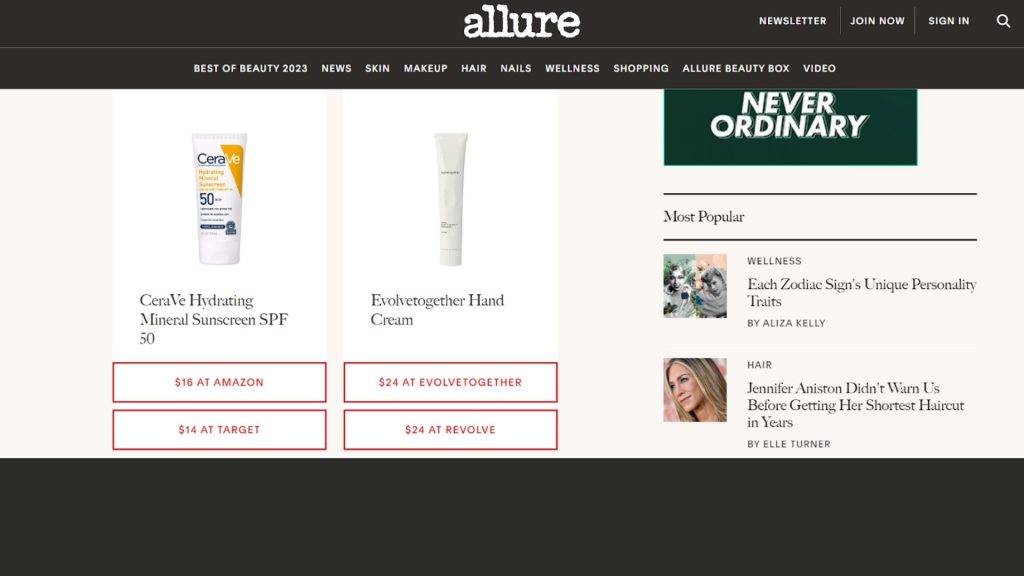
While affiliates might have knowledge about and interest in the products they promote, they come to your brand mainly for commissions. In other words, their initial engagement is for financial incentives rather than a personal connection with the brand.
Goal
Ambassadors focus on building and enhancing the brand’s image and awareness. These individuals believe in the brand’s values and mission. They deliver these values and share their positive experiences with audiences.
Ambassadors aim to create a positive association between themselves and the brand. In short, their work represents their passion, loyalty, and desire to build an enduring collaboration.
Affiliat’s approach is slightly different. They leverage their channels to reach a larger audience on different platforms. Though they also help boost brand awareness, their focus leans toward a more tangible result. It’s about driving traffic to the brand’s website and generating leads or sales.
Target audience
The ambassador’s main goal is to contribute to the brand’s long-term image. Thus, they often reach a broad audience aligning with the brand values.
For this reason, they head to passionate fans and loyal customers. These individuals already love the brand and its values. They may be engaged in the brand community.
Ambassadors also desire to foster a connection with those likely to follow them over an extended period. Focusing on potential customers might contribute to sustained brand loyalty and positive sentiment.
How about affiliates?
These advocates often play a crucial role in customer acquisition. They can target those who may not know the brand before. That’s why they dedicate pieces of content that introduce the brand to a new audience.
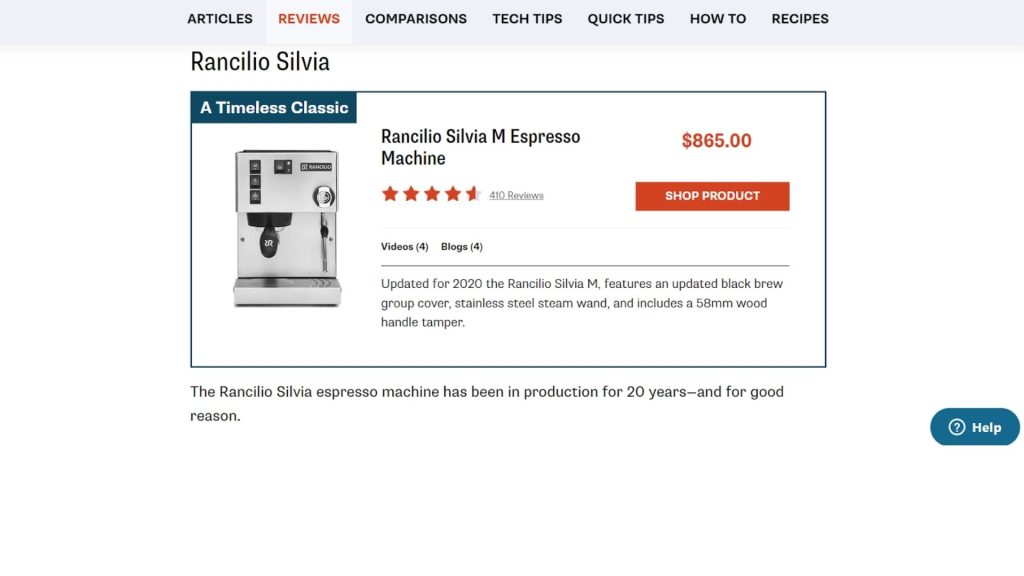
However, new customers are not the only goal of affiliates. They can also contribute to customer retention and upselling efforts. This is the point when they target individuals who are already familiar with the brand.
One characteristic of the affiliate’s target audience is the niche-focused feature. It means they cater to the interests and needs of a particular group of customers. Besides, as mentioned, affiliates often have short-term goals tied to performance metrics. Thus, their audience is those who respond to promotional content. They’re more likely to convert within a shorter timeframe.
Reward
The compensation structures can vary based on the brand’s specific goals and strategies. Here’s a breakdown of what we offer the two advocates:
Brands often award their ambassadors a fixed fee or retainer for their association. Besides, there are also non-monetary benefits. The most frequent type that you might realize is free products. Exclusive access to new products, product discounts, and event invitations are other opportunities for ambassadors.
These reward structures are often flexible. They might vary based on the individual ambassador’s influence and contributions. Brands will evaluate their effectiveness through the specific results. It could be increased brand awareness, engagement, community growth, etc.

Well, the prevalent reward for affiliates is commission. It’s often a fixed rate or a percentage of the affiliate sales. The calculation of commissions relies on the compensation models. The most common types are pay-per-click, pay-per-lead, and pay-per-sale.
Some affiliate programs also have tiered commission structures. Simply put, the better affiliates perform, the more they earn.
Besides commissions, brands may offer affiliates bonuses. These incentives are to reward their remarkable milestones. For instance, they reach a certain number of sales or conversions. Exclusive affiliate discount codes and vouchers are other ways to reward affiliates.

Promotional mediums
Ambassadors leverage their online presence, where they often have a significant following. They often use social media platforms like Instagram and Twitter or websites and blogs.
Here, they share user-generated content and updates on the brand and its products. Their content format varies. It includes photos, videos, blog posts, etc. Ambassador’s privilege lies in their personal experiences with the brand’s products. Thus, they try to tell engaging, authentic stories.
For this digital type of medium, they might share content with or without tracking links.
Besides digital channels, brand ambassadors are also involved in offline promotion. They join trade shows, brand events, product launches, and other networking activities. Their physical presence adds a personal touch and strengthens the brand’s presence.
Affiliates, on the other hand, focus on their digital assets for promotion. The reason is that their pieces of content come with affiliate links. It’s pretty easy to understand! We need something to track their performance and award them. Thus, whether creating content on blogs, social networks, emails, or paid advertising, links are necessary to drive the audience to the brand’s site.
What is a brand ambassador?
This role refers to an individual who promotes a brand’s image and its products or services. You might easily spot many public figures being an ambassador of well-known brands. For instance, the collaboration between Cartier and Elle Fanning or Aveeno and Jenifer Aniston.
However, the range extends beyond that, covering influencers, industry experts, and loyal customers.
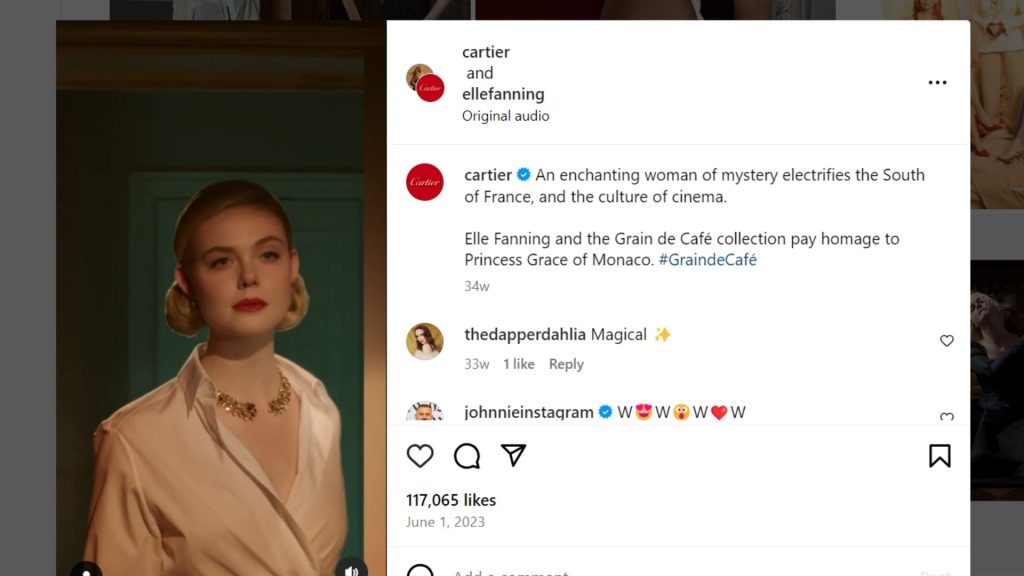
These advocates serve as a living representative of the brand in a positive light. Their mission is to embody the brand’s identity in an authentic and positive manner.
A strong personal connection with the brand is key for ambassadors to build genuine recommendations. They spread these recommendations through their significant presence. It includes digital channels and offline events.
Note that ambassadors represent only that brand within a specific industry or niche. Plus, partnerships with brands are often long-term. This loyalty helps build a consistent brand image. It also reinforces the connection with the audience.
Benefits When Working with Ambassadors
Many brands are willing to invest a large budget in hiring ambassadors. What’s the reason? Well, the effect of these advocates is more blooming than you might think. Let’s find out!
Meet a person who knows and loves your brand
Ambassadors have a deep understanding and love for your brands and products. Their passion shines through in their every interaction. They’ll share their stories in the most natural way possible, without any signs of forced incentives.
Brand ambassadors also integrate the brand’s products into their lifestyle. This natural integration makes their promotion even more organic.
Boost brand awareness and reach
Ambassadors typically have their own dedicated following. Take the fan base of a famous singer or model as an example.

They often create relatable and authentic content that meets the tastes of their followers. This approach is a powerful tool for showcasing your products in real-life situations.
So, partnering with ambassadors can expand your brand’s reach to new audiences. Ultimately, it increases overall visibility.
Enhance brand image and reputation
Imagine how your situation changes when collaborating with a reliable, well-known figure. Reputation boosts 1000%.
Ambassador’s genuine passion and personal connection with your brand lead to increased trust among their audience.
As a result, you can strengthen your brand image and foster a stronger emotional connection with potential customers.
Drive sales and conversions
The primary goal of the ambassador program does not lie in direct sales and conversions. In the long run, however, it does.
Ambassadors act as powerful advocates through word-of-mouth marketing. Genuine recommendations from these trusted voices can significantly influence the purchasing decisions of their followers.
Plus, they often interact with customers and address their concerns. This deeper engagement can nurture leads and turn audience members into loyal customers.
Gain valuable feedback and insights
Brand ambassadors understand and use your products. They can provide valuable feedback on your offerings from a customer perspective. This contribution will help you improve your approach to serve your target audience better.
How to Find a Brand Ambassador
We understand how ambassadors positively impact our brand and customers. The question might be: “How can we find them?”.
Brands use different ways to recruit these advocates based on their resources and strategy. Here, we round up a list of the five most effective methods. Keep scrolling to explore!
Look for brand ambassadors on social media
The burst of digital connections makes it a goldmine for brands seeking the perfect ambassador. These platforms bloom with passionate brand advocates and hidden influencers. They might be waiting for a chance to spread your story.
Determine which platforms are most relevant to your brand. Instagram, Facebook, or TikTok? It takes time to consider.
It’s a wise move to utilize associated hashtags to discover potential content creators and influencers. Monitoring those already talking about your products or services is another effective approach. As you search, prioritize those with a meaningful and engaged target audience.
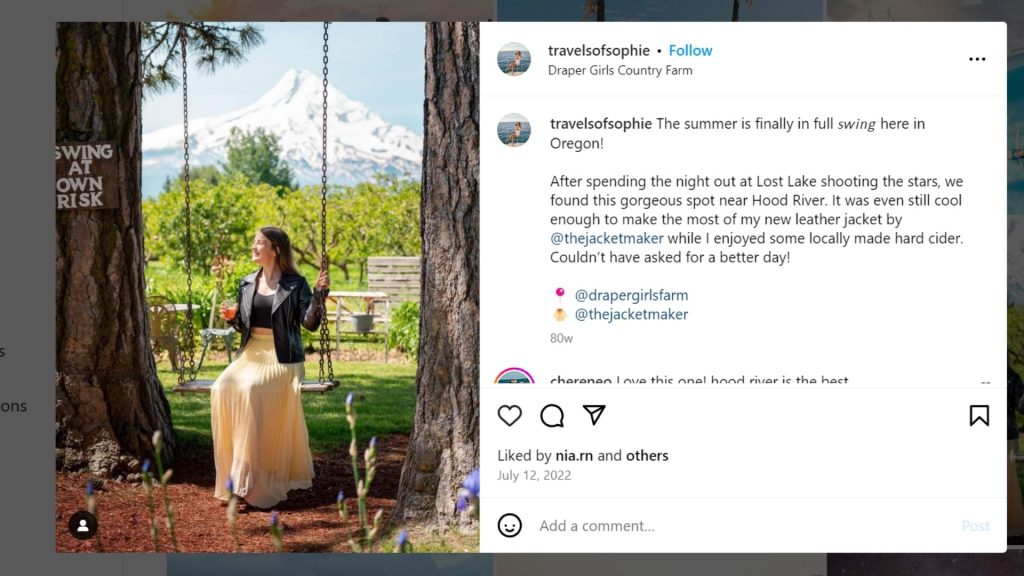
Bonus tip: Share a focus on micro-influencers. These individuals may have smaller but engaged followings. They can become valuable brand ambassadors.
Tap into the current customers
Loyal customers might become the ideal ambassadors brands seek. They’ve used your products for a while. Their experience and satisfaction make them the most valuable assets for your ambassador campaigns.
Now, turn on the radar. Who has consistently purchased from your brand? Who actively interacts with your social media posts? Look for loyal customers who have provided positive feedback or engaged with your products over time. They are more likely to be passionate about representing your brand.
Once you’ve identified potential names, communicate the opportunities to them. Reach out via channels like email, social media, or in-app messaging. Explain the benefits or any extra incentives to persuade them to be your ambassadors.
Create a brand ambassador program
This approach requires a clear outline of the guidelines and expectations for brand ambassadors. What are the responsibilities these advocates perform when joining your program? How about the key performance indicators?
Develop a structured landing page and detailed form to facilitate the application process. The application form should capture essential information about potential ambassadors. Add questions to evaluate their style, creativity, and familiarity with your products or services.
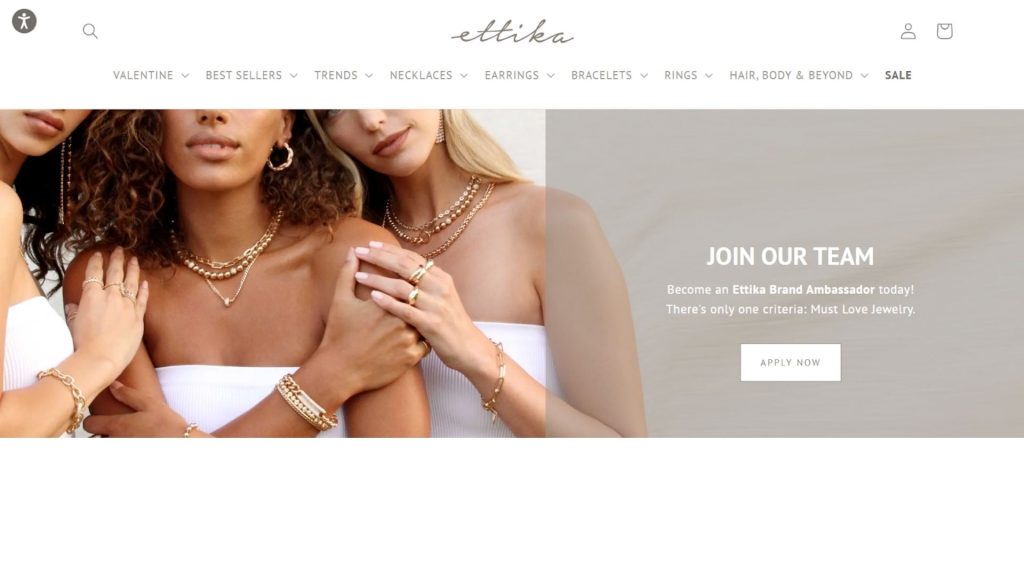
Emphasize the compensation and incentives for brand ambassadors. It makes your program more compelling to visitors. You can also showcase some successful ambassadorships to inspire others.
Note: Optimize your landing page to enhance its visibility in search engine results.
Encourage your employees to become ambassadors
It’s enough to scan far and wide. The perfect representative might lie within your company.
Your employees are a part of your business. They might share valuable information about the products from a more thorough perspective.
If you don’t know where to start, consider creating a specific brand ambassador program for employees. It fosters fair competition among those interested. Note that authenticity is key. So, don’t force it. Let your staff share their love and passion for your brand in an enthusiastic and natural way.
Don’t forget to tell them about the compelling benefits. Highlight how their support can contribute to the company’s overall success. Plus, give them incentives for extra motivation. This could include recognition within the company, exclusive perks, career development opportunities, etc.
What is an affiliate?
An affiliate is an individual or a company that leverages its marketing efforts to promote the products or services of other brands.
They’ll use various digital channels and strategies to achieve specific goals. It could include content creation, email campaigns, or social promotion. Their goals vary from generating traffic to driving sales.

The most crucial element of affiliate campaigns is the unique tracking links. These links allow the brands to track actions generated by the affiliates. They serve as the foundation for accurate commission calculations.
Speaking of commission, this is the monetary reward for the affiliate’s efforts and creativity. Brands will define the affiliate program terms for commission structures. It could be pay per sale or lead, depending on their goals.
Benefits of Working with Affiliates
Increase the brand’s reach
Affiliates help extend the reach of your products to new audiences. They use diverse marketing channels. This way, your brand can tap into different audience segments and demographics.
Even better? They target those audiences relevant to your niche or industry. This is a good sign for increasing the likelihood of conversions.
Drive sales and conversions
Affiliates act on performance-based models. They try to drive traffic to your site and boost sales. To support this goal, they’ll develop reliable recommendations to gain the audience’s trust. Their strategies will help convert leads into paying customers.
Develop cost-effective marketing
Working with affiliates requires minimal upfront costs. It could involve an affiliate recruitment fee or promotional assets.
Business pays affiliates only when they successfully drive the desired actions. This model eliminates the risk of spending on promotional activities without guaranteed results.
Additionally, it’s flexible for businesses to allocate their budget more strategically. They can focus on channels or affiliates that deliver more impressive results.
Facilitates easy scalability and global reach
What makes affiliate marketing easily scalable?
Well, it’s the approach of a diverse network of affiliates. Influencers, bloggers, and niche marketers will expand your potential customer base. And it’s not just limited to a specific region.
Look forward to the prosperity of your program when it goes global.
Scalability also shows in the flexible program structure. You can adjust commission structures or introduce new promotional materials to scale affiliate’s efforts.
How To Find Affiliates?
We have to admit that finding an affiliate is not as challenging as hiring an ambassador. Businesses can choose among various ways to recruit affiliates for their affiliate marketing programs. Let’s see which way might suit your strategy the most!
Join affiliate networks
Have you ever heard of CJ Affiliate, Impact, or ShareASale? They’re affiliate networks that connect your brand with the most potential affiliate marketers. These advocates may operate in various niches and cater to different audience segments. This diversity allows businesses to reach a wide audience within their industry.
Many brands choose to partner with affiliate networks to enhance the credibility of their affiliate program. As a result, they can attract successful affiliates who are more likely to generate positive results.
However, make sure you choose reputable parties for effective recruitment. Those we’ve just mentioned are some prime examples.
Create an engaging landing page
Just like recruiting ambassadors, you need a landing page to showcase your affiliate program. Include the most crucial information on this page. It often includes benefits for affiliates, requirements, the signup process, and testimonials.
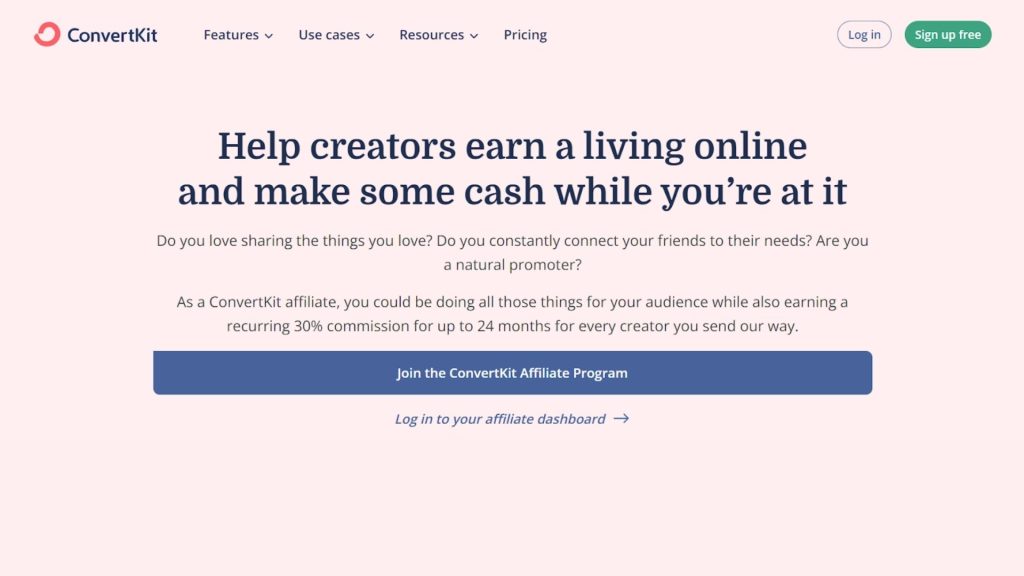
Highlight the unique selling points to make your program stand out. For instance, you could offer exclusive promotions, access to pre-launch products, or special training.
Note: Remember to include the program link in the header or footer of your website. This way, interested advocates can easily navigate your program.
Leverage social media platforms
Now, dive deep into the pool of active influencers and content creators.
You can promote your program on channels of your choice. For instance, you can craft an Instagram post or a compelling announcement tweet. As you approach this method, include a clear call-to-action and relevant hashtags to expand your post’s reach.
Another method is to search manually. Use the search function on platforms like Instagram or Twitter to look for relevant keywords and hashtags related to your niche. Then, target individuals with a significant following or engaged audience in your industry. You can contact them through emails or messeages to discuss the collaborations.
Encourage existing customers to join
Your customer base is also a good source for recruiting affiliates. Satisfied customers who trust your products will likely be enthusiastic about promoting them.
Consider promoting these potential advocates via email, in-app notifications, or online communities. You can share success stories of existing affiliates who were once customers. This social proof can inspire existing customers to join and showcase their abilities.
Participate in industry events and conferences
If you’re tired of scouring the internet for candidates, this is your solution. Meet them face-to-face through industry trade shows and events.
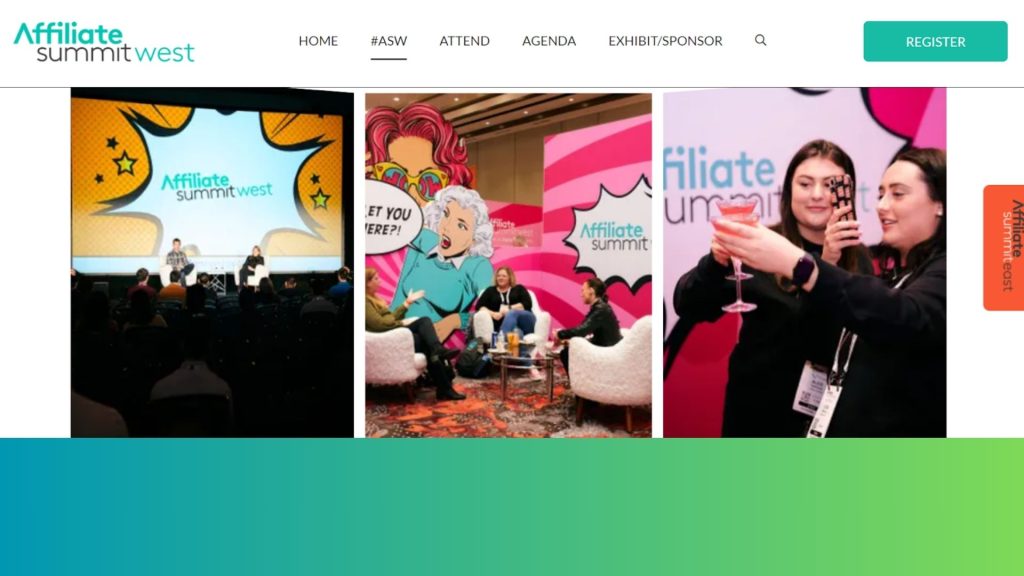
Grab the chance to showcase your brand and affiliate program. Then, network with relevant attendees. Focus on marketers, influencers, and content creators within your niche.
Let’s guide conversations into exchanging contact information and expressing your desire for successful collaborations.
Brand Ambassadors Vs Affiliates: Which One is Suitable for Your Business?
Here comes the most challenging part. Which is the optimal solution, ambassadors or affiliates?
It requires lots of evaluation before locating the right advocates. Let’s review some critical criteria that you should consider!
Marketing goals: What are you aiming for when hiring these partners? Is it about brand building, community engagement, or product sales? Plus, determine the engagement that you want to build with them.
Target audience: Define their preferences and behavior. Some might value storytelling and a sense of community. Others might be more receptive to transactional promotions and exclusive discounts.
Resource and budget: Consider your available time and effort. How much can you invest in these models?
From these elements, we’ve got some suggestions for you.
When should brands work with ambassadors?
You prioritize brand awareness and value
Are you placing a high value on authenticity and brand image? Ambassadors will help you convey these aspects effectively. With a love and passion for your brand, these advocates can embody your brand values. They’ll transfer the best image to the community.
You’re looking to enhance your brand visibility online and offline
Focusing on a brand ambassador could be effective in this case. This figure can represent your brand in various channels. Whether it’s a social media platform or an offline event, ambassadors help build authentic connections with audiences.
You want to develop a long-term relationship and foster community engagement
Brand ambassadors are a suitable choice if you desire an ongoing engagement. These partners have a deep connection to your brand. They’ll keep creating authentic storytelling that builds trust and loyalty over time.
Plus, ambassador roles are crucial in creating a loyal community around your brand. These audiences tend to become potential customers in the near future.
Lifestyle and story-telling are key
Go for ambassadors if you want to see lifestyles and experiences in the promotional content. They often bring their unique perspectives to stories. This effort goes beyond advertising, contributing to a more engaging brand presence.
When should brands work with affiliates?
You want to drive quick online sales and conversions
For brands looking for quick and measurable results, affiliate marketing is a suitable strategy. You might know the reason why. Affiliates are performance-driven. Their efforts are totally for actual results that may earn them commissions.
You aim to reach a wider audience quickly
Affiliates, through their diverse marketing networks, can promote your brand far and wide. This nature of affiliate marketing aligns well with the goal of quickly reaching a broad audience.
You prioritize cost-effective marketing
Let us remind you of the cost-effective affiliate marketing model. Your expenses are directly tied to affiliate results. You’ll spend your money only on successful sales or conversions.
Best Brand Ambassadors and Affiliates Management Tools
Finding the right partners is crucial. Managing them requires another effective approach. This section aims to facilitate this process by mentioning the best management tools. Check them out!
Grin
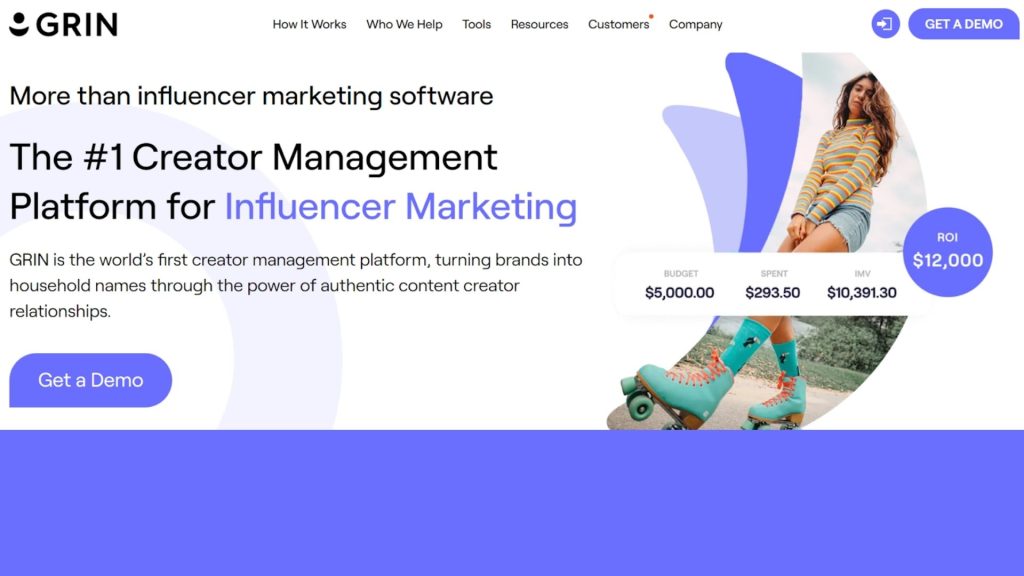
Let’s start this list with Grin. This platform empowers brands to build authentic relationships with creators of all levels. It offers tools for identifying individuals who align with your brand. Beyond that, it provides a centralized hub for managing influencer relationships. You can communicate with influencers, measure their performance, and track the progress of your campaigns.
UpPromote
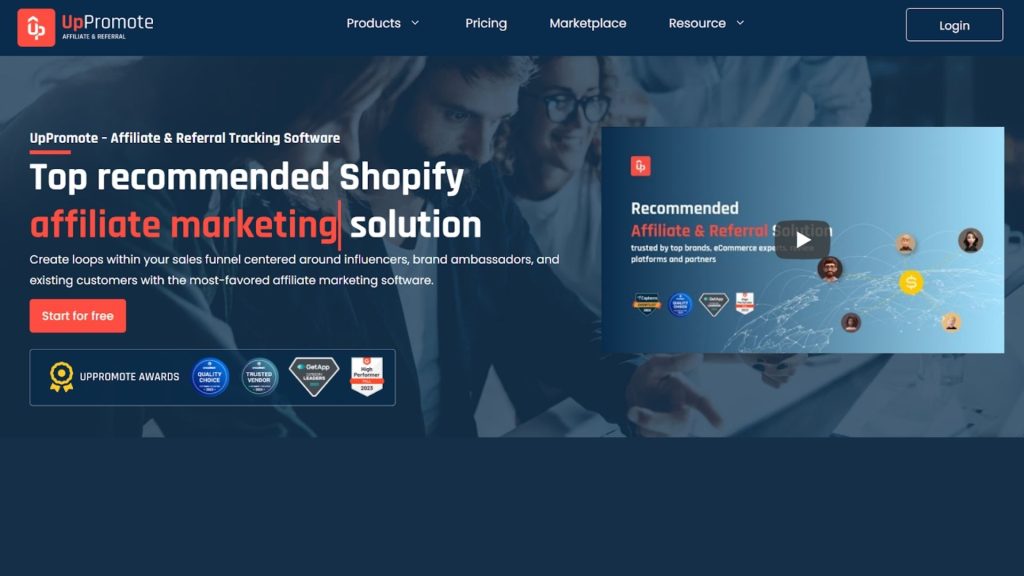
Are you aiming to simplify and streamline your influencer outreach and management? UpPromote is a striking choice.
This tool allows brands to create, launch, and manage influencer marketing campaigns. With UpPromote’s detailed analytics, you can evaluate how your programs are performing. Benefit from tracking sales to measure the overall ROI of your campaigns.
UpPromote also helps you save time and resources due to automated payments. Additionally, take advantage of its extensive marketplace. it gives you chances to find the perfect influencers for your program.
Refersion
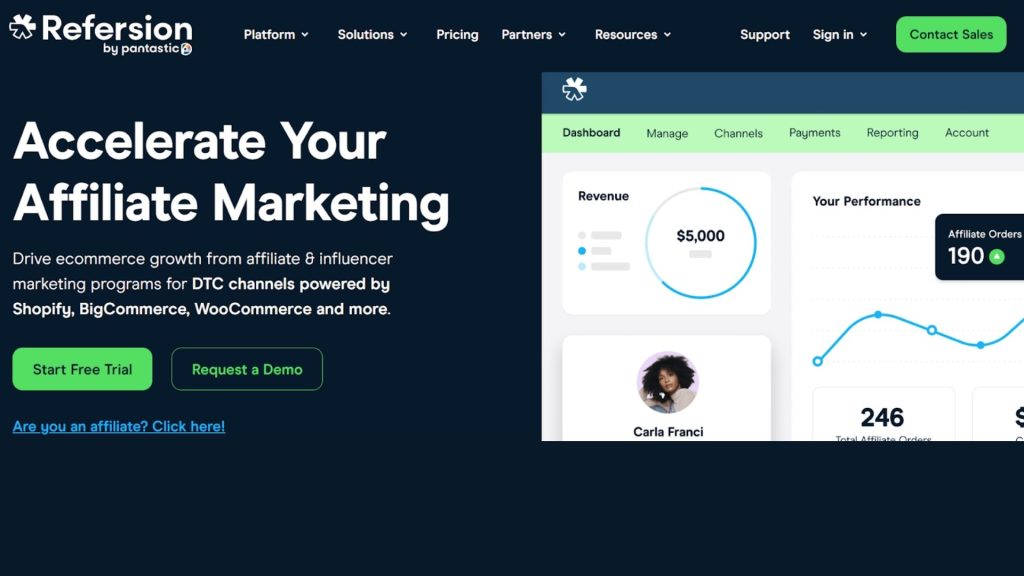
Refersion stands out for its affiliate tracking system. It enables brands to monitor sales, clicks, and conversions accurately. This platform also provides real-time analytics and tracking tools. These insights are valuable for brands to make data-driven decisions.
Another key strength of Refersion is its integration with popular e-commerce platforms. This way, brands can analyze influencer performance alongside other marketing metrics. Data can show up within their e-commerce dashboard.
Creator.co
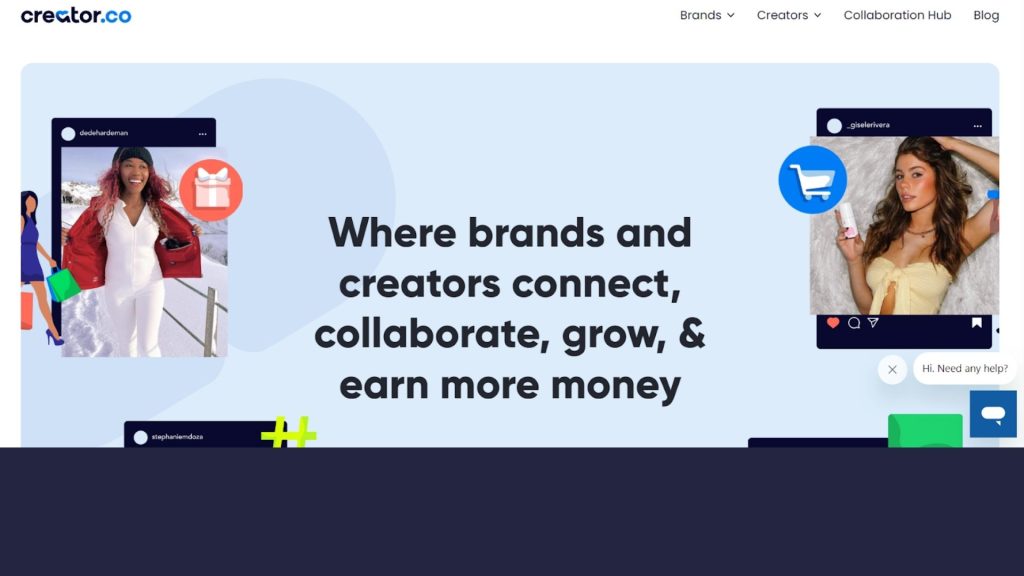
This is another platform that aims to connect brands with creators. Creator.co makes it easy to create and manage marketing campaigns. You can use its tools to set up your campaign and then invite creators to join. Creator.co also provides detailed tracking and reporting. For instance, you can see how many real people have seen your influencer’s content or converted into customers.
Besides, access its discovery tool to explore millions of creators across various platforms. It assists your search based on demographics, interests, engagement metrics, etc.
Everflow
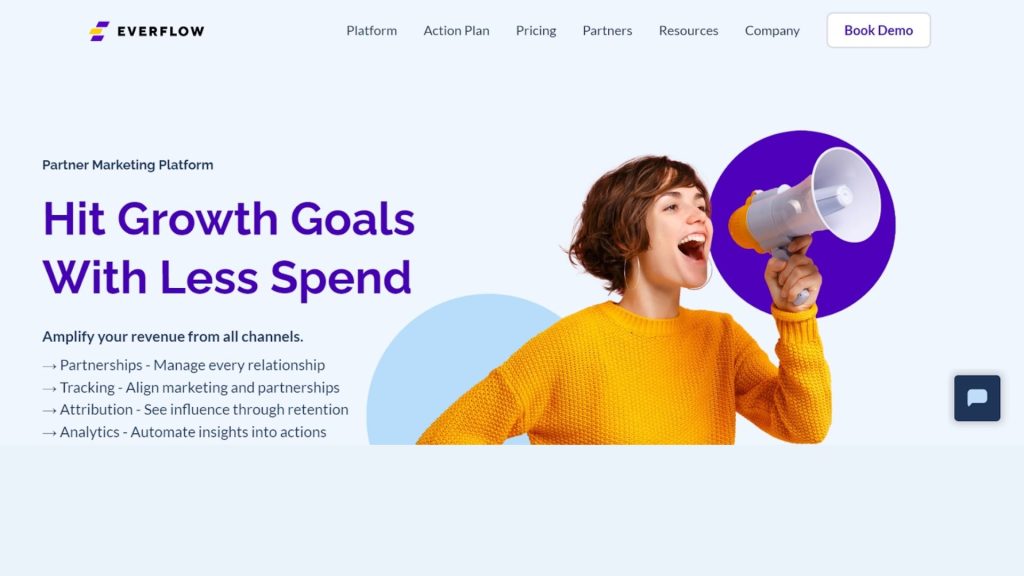
Let’s wrap up this list with Everflow. This platform is well-known for its massive database of over 100 million influencers across different platforms.
Here, brands can build their campaigns from scratch. Everflow supports them with setting goals, budgets, and clear communication channels. Like many others, this software also facilitates real-time tracking and automated payments.
FAQs
- Is ambassador marketing the same as affiliate marketing?
While both models share some similarities, they are not the same. Affiliate marketing involves partnering with individuals who drive direct sales and conversions. Otherwise, ambassador marketing builds brand awareness and loyalty through passionate individuals who genuinely love your brand.
- Ambassador vs affiliate: Which should be used in 2024?
The choice between ambassadors and affiliates in 2024 depends on each brand’s situation. The appropriate selection requires careful consideration. It’s about your brand’s objectives, audience, and marketing strategy.
- Brand ambassadors. Affiliates. Influencers. What are the differences?
Ambassadors help build brand loyalty and community trust. Affiliates are performance-driven advocates who generate immediate conversions and sales. Influencers are those who have a large audience reach and generate various content. They are potential ambassadors and affiliates that most brands are looking for.
Conclusion
Wrapping up, ambassadors and affiliates play meaningful roles in enhancing a brand’s visibility. However, they differ in their approaches, engagement, and compensations.
As you are involved in the brand ambassador vs. affiliate battle, carefully evaluate your goals and resources before deciding who takes the crown. Some brands, however, may find success in combining both strategies. If it’s a case of your business, grab the chance to leverage the unique strengths of each advocate.
Fuel your marketing strategy with the right partners and watch it thrive!










